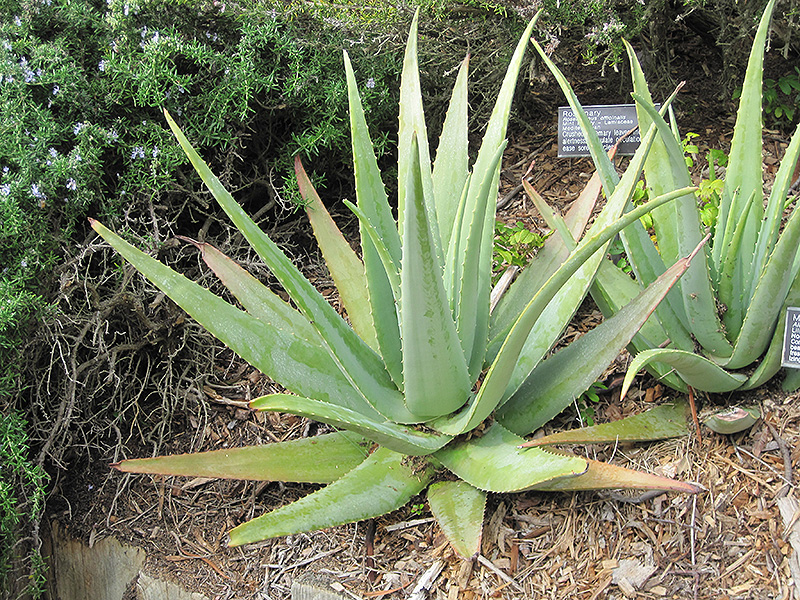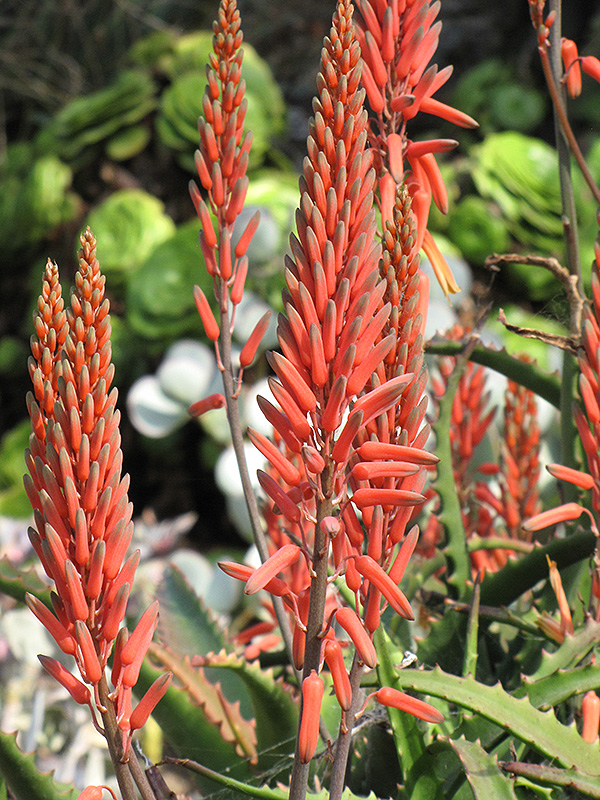Search Our Plants
Plant Height: 24 inches
Flower Height: 3 feet
Spread: 24 inches
Sunlight:
![]()
Hardiness Zone: 9
Other Names: Medicinal Aloe, syn. Aloe barbadensis
Description:
An attractive plant in the garden, and also widely used in commercial trade as an ointment or herbal remedy; produces racemes of yellow flowers in spring or summer; a wonderful garden or container accent
Ornamental Features
Aloe Vera's attractive succulent sword-like leaves emerge light green in spring, turning bluish-green in color the rest of the year on a plant with an upright spreading habit of growth. It features dainty racemes of yellow tubular flowers rising above the foliage from late spring to early summer.
Landscape Attributes
Aloe Vera is an herbaceous evergreen perennial with an upright spreading habit of growth. Its wonderfully bold, coarse texture can be very effective in a balanced garden composition.
This is a relatively low maintenance plant, and usually looks its best without pruning, although it will tolerate pruning. Deer don't particularly care for this plant and will usually leave it alone in favor of tastier treats. Gardeners should be aware of the following characteristic(s) that may warrant special consideration;
- Spiny
Aloe Vera is recommended for the following landscape applications;
- Mass Planting
- Rock/Alpine Gardens
- General Garden Use
- Container Planting
Planting & Growing
Aloe Vera will grow to be about 24 inches tall at maturity extending to 3 feet tall with the flowers, with a spread of 24 inches. It grows at a slow rate, and under ideal conditions can be expected to live for 40 years or more. As an evegreen perennial, this plant will typically keep its form and foliage year-round.
This plant should only be grown in full sunlight. It prefers dry to average moisture levels with very well-drained soil, and will often die in standing water. It is considered to be drought-tolerant, and thus makes an ideal choice for a low-water garden or xeriscape application. It is not particular as to soil pH, but grows best in sandy soils. It is somewhat tolerant of urban pollution. This species is not originally from North America. It can be propagated by division.
Aloe Vera is a fine choice for the garden, but it is also a good selection for planting in outdoor pots and containers. With its upright habit of growth, it is best suited for use as a 'thriller' in the 'spiller-thriller-filler' container combination; plant it near the center of the pot, surrounded by smaller plants and those that spill over the edges. It is even sizeable enough that it can be grown alone in a suitable container. Note that when growing plants in outdoor containers and baskets, they may require more frequent waterings than they would in the yard or garden. Be aware that in our climate, this plant may be too tender to survive the winter if left outdoors in a container. Contact our experts for more information on how to protect it over the winter months.
This Plant Finder tool is an online catalog representing many of the varieties that we carry over the course of the season, and is intended for informational purposes only. Inventory varies seasonally, so we cannot guarantee that every plant will be in stock at all times - please contact your nearest Platt Hill Nursery store for current availability. It does not include our entire inventory of plants, so be sure to visit us to see varieties that may not be represented on this list.



